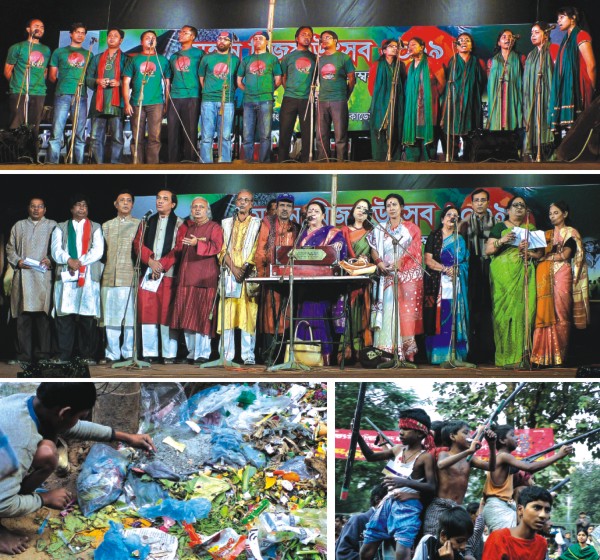Reflections
The Spirit of Liberation
Jonathan Richmond
"My son sacrificed his life for liberation," said the gentleman sitting a couple of seats away from me in Shilpakala. He did not give his name, but the loss defined his identity with a pride in his son's memory accompanied by the unthinkable pain that never goes away: the pain suffered by a parent when the a fundamental rule of nature is broken and a child passes out of their life.
Bijoy Diboshe is a defining day for Bangladesh: a day of pride and of pain. The way I saw it conducted in Dhaka, it brought out the best of a nation that strives to unleash at least some joy while it continuing to rank as one of the world's poorest countries.
Bangladshis are a gentle people. Walking around the Dhaka University area, there were endless smiles. People approached to say hello and ask who I was. They smiled and chatted and smiled some more. This is not London where someone approaching closer than a couple of feet without invitation is regarded as an invader of personal space!
There were tons of young people with Bangladeshi flags wrapped round their heads. Their families created Bangladesh heroically, releasing the country from an unthinkable tyranny. The young identified with history as they climbed onto the Martyrs Memorial to have their pictures taken next to the statues of freedom fighters.
One of the only foreigners in sight, I was stopped many times. I was asked what I thought of the day. I replied that what Bangladesh suffered is beyond belief. I confessed I could not understand the murderous behaviour of the Pakistanis. Is this something anyone could understand?, I wondered.
Then I turned their question around: "Is it a complete vistory when the nation suffers such extraordinary poverty and is burdened with such corruption?” I asked.
Kids pretending to be freedom fighters tore past, a dozen at a go accommodated on bike-pulled conveyances. They pointed their toy guns at me and giggled, but I wondered if this was entirely a joke. At a young age their parents have told them of the torture out of which this nation was born.
Bangladesh enjoys not only a population that rose together heroically to guarantee liberty but other significant marks of high civilization. Its higher education sector is excellent, with many universities meeting world-leading standards. And the artistic life of the country is on a very high plane, with a depth and breadth of offerings that command attention and involvement. The array of art galleries in Dhaka seem endless, while crowds congregate every day to hear music crafted as a universal language of suffering and redemption.
Shilpakala Academy hosted a special arts evening to commemorate the valour of those who sang over the radio to encourage the battle for liberation. Now older and joking that they weren't quite what they used to be, this claim proved to be not quite true. As a group on stage, the energy of their patriotic songs brought back the taste of freedom-craving youth. The singing was startling in its freshness and energy. I looked round and saw slabs of sardine-packed youth standing in concentrated awe at the side of the overflow performing space. In how many countries do young people mass like this to honor those who valiantly went before them?
We heard solos from the former radio singers too. I could not directly understand the Bangla words, but the universal language of music conveyed moods ranging from a devastating sadness driven home by mezmerising tabla playing to a powerfully hurled and uplifting vocal call to the promise of freedom to banish evil.
Shilpakala juxtaposed the tortured and the sublime seemingly without contradiction, music of hope following sounds of despair, and rapturous dance interludes providing moments of calm in-between.
A recital of poetry of war and liberation by a group of actors was at once agonised and jubilant: the voices projected with precision and clarity hit like machine gun fire but also reached into the realm of the serene, intimately evoking the soul of a nation struggling to be free.
I left this extraordinary evening both full of admiration for Bangladesh and feeling troubled. I could not forget the child I'd seen in Old Dhaka digging through the most horrific trash to retrieve the used syringes of drug addicts and separate the plastic from the needles to sell for recycling. Can someone explain the following to me: We have in Bangladesh a nation with the organization and heroic willpower to come together to expel a life of oppression. This is a people of gentle disposition but also equipped with a strong identity and love of country. This is a place where literature and the arts are conducted at the highest level, where higher education thrives and with a vibrant youth eager to build for the future.
Why, then, so many years after liberation, does Bangladesh suffer from some of the worst poverty in the world? Why do so many children have to work in apalling conditions rather than go to school? Why do so many of the country's most talented flee for opportunities in other countries when they are most needed at home? Why is Dhaka, a place of high culture, one of the globe's ugliest and most dysfunctional cities; a place full of dirt and decay where no city services function adequately; a place of broken pavements, endless power cuts and burned out street lamps; a place where raw suffering is on daily display; but also a dark container from which even those with money cannot find escape. They too are trapped in an all too often grey life imposed in a city that has spun out of control.
Why can the glories of this country shown in the patriotic fervour of Dhaka's Victory Day street parades and in the greatness of Shilpakala's performances not also govern the conduct of everyday life?
Photos: Jonathan Richmond

Copyright
(R) thedailystar.net 2009 |
